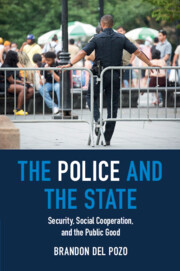Book contents
- The Police and the State
- The Police and the State
- Copyright page
- Contents
- Introduction
- Chapter 1 The Role of the Police
- Chapter 2 The First Power of the Police
- Chapter 3 The Second Power of the Police
- Chapter 4 The Third Power of the Police
- Chapter 5 Democratic Priorities, Relationships, and Tensions
- Chapter 6 The Bases of, and Reasons for Seeking, Police Legitimacy
- Chapter 7 Procedural Justice in Policing Revisited
- Chapter 8 Policing with Public Reason
- Chapter 9 Policing Populism, Protecting Pluralism
- Chapter 10 Primary Goods, Policing States in Transition, and Natural Experiments
- References
- Index
Chapter 4 - The Third Power of the Police
Brokering and Enforcing Social Cooperation
Published online by Cambridge University Press: 17 January 2023
- The Police and the State
- The Police and the State
- Copyright page
- Contents
- Introduction
- Chapter 1 The Role of the Police
- Chapter 2 The First Power of the Police
- Chapter 3 The Second Power of the Police
- Chapter 4 The Third Power of the Police
- Chapter 5 Democratic Priorities, Relationships, and Tensions
- Chapter 6 The Bases of, and Reasons for Seeking, Police Legitimacy
- Chapter 7 Procedural Justice in Policing Revisited
- Chapter 8 Policing with Public Reason
- Chapter 9 Policing Populism, Protecting Pluralism
- Chapter 10 Primary Goods, Policing States in Transition, and Natural Experiments
- References
- Index
Summary
This chapter recasts the police power to pursue order maintenance as the brokerage and enforcement of the fair terms of social cooperation in a community’s public spaces. The nature of dense, urban living, and various conceptions of the good in a pluralist state unavoidably come together to make legitimate, competing uses of public space incompatible, and in some cases facially uncooperative. The state’s duty to promote fair use in ways that protect and facilitate pluralist interests is accorded to the police, who should privilege brokerage over enforcement whenever possible. Nongovernmental (e.g., informal) adjudication of competing uses carries the risk of illiberal outcomes driven by populism, majoritarian preference, or the occupation and use of space by force, intimidation, or other arbitrary means. That said, the formal policing of social cooperation is also subject to these risks, so while laws that are either underdetermined or inherently designed to promote cooperation through discretionary enforcement underwrite the second power of the police (e.g., disorderly conduct, or quality of life statutes), as a matter of justice the decisions police make based on them will require reasons and justifications that honor democratic pluralism.
Keywords
- Type
- Chapter
- Information
- The Police and the StateSecurity, Social Cooperation, and the Public Good, pp. 61 - 88Publisher: Cambridge University PressPrint publication year: 2022

